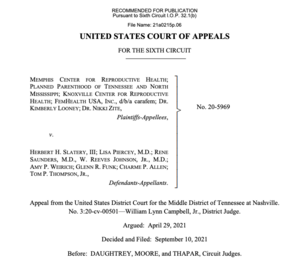
O. Carter Snead, professor of law and director of the de Nicola Center for Ethics and Culture, was cited in a landmark dissent by Judge Amul Thapar of the US Sixth Circuit Court of Appeals, in which the judge called for the US Supreme Court to overturn their precedents in Roe v. Wade and Planned Parenthood v. Casey, in order to "tow our jurisprudence back to the safe harbor of democratic legitimacy."
The case, Memphis Center for Reproductive Health v. Slatery, overturns Tennessee House Bill 2263, which established two abortion restrictions criminalizing both the performance of abortions after the detection of fetal heartbeat and the performance of abortions sought due for discriminatory reasons including race, sex, or prenatal diagnosis of Down syndrome. Professor Snead served as an expert witness in the case, testifying that the bill would "prevent vulnerable populations from being subjected to discrimination and cruel, inhumane, and degrading treatment."
In his partial dissent, Thapar cites Snead’s recent book What It Means to be Human: The Case for the Body in Public Bioethics (Harvard University Press, 2020) for the proposition that "pre-viability bans are inconsistent with a good-faith reading of Casey," a Supreme Court precedent that he is bound to follow as a judge on the U.S. Court of Appeals. However, Thapar asserts that both "Roe and Casey are wrong as a matter of constitutional text, structure, and history," quoting Justice Clarence Thomas's dissent in June Medical Services. v. Russo that the Court had "created the right to abortion out of whole cloth, without a shred of support from the Constitution's text."
"The Constitution leaves decisions like this to the states," concludes Thapar. "The state legislatures can do what we can’t: listen to the community, create fact-specific rules with appropriate exceptions, gather more evidence, and update their laws if things don’t work properly. And if the public is unhappy, it can fight back at the ballot box. The courts should return this choice to the American people—where it belongs."
In his 35-page opinion, Thapar also cites, inter alia, Notre Dame emeritus Biolchini Chair of Law John Finnis (Permanent Senior Distinguished Research Fellow of the de Nicola Center) and Associate Professor of Law Sherif Girgis (Faculty Fellow of the de Nicola Center).
